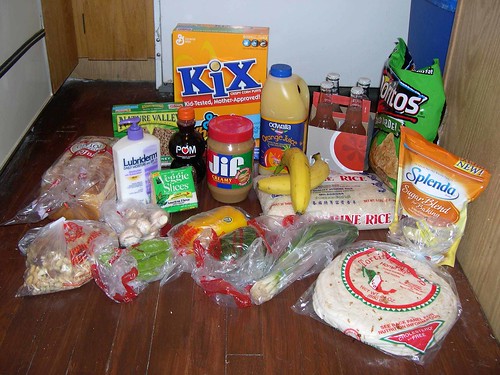How to Make a Smart Grocery Budget
Whether you're frugal or simply want to know where your money goes, having a grocery budget is essential. While feeding your family is essential, it can be done on a budget to help you keep expenses down in order to grow your savings.
Most people don't know how to create a grocery budget. Instead, they simply go to the grocery store, throw a bunch of stuff in their cart and pay whatever the total is. If you want to start budgeting your money, the following tips will help you create a grocery budget.
1. Know what you can realistically spend.
Think of your grocery budget as another necessary bill. Add your monthly household income and subtract your regular expenses, such as utility bills, membership fees, tuition, etc. Once you have this figured out, the money left over is your "extra" money, meaning money that you use for entertainment, groceries, dining out, etc. Figure out how much money per month you can afford to spend on groceries, and then divide this number by four. You now have a weekly grocery store budget.
2. Know what you typically spend.
For one month, keep track of all your grocery receipts. Place them in an envelope somewhere you'll remember, such as on top of the fridge (or even on the fridge). Any food receipts, even those "I-forgot-one-thing-so-now-I-have-to-run-out" items. When the month is over, add up all of your receipts and divide them by four to see what your average weekly spending comes out to be. If you spend less than your goal budget, you can try to lower your goal budget to give you some extra savings. If you spend more than your goal budget, you will have to work hard to achieve it.
3. Figure out where you can make cuts.
Go through your fridge, freezer and pantry to see what you have. Is there anything that you have bought that you don't really need? Has that bag of pretzels been sitting in your pantry for two months? Do you have unopened packages of cheese in your fridge? You need to find the items you don't regularly use, and eliminate them from your grocery list.
4. Make a weekly grocery list.
Every week, plan out your meals in advance and make a list of everything you will need for breakfast, lunch and dinner for the week. Always check your pantry, fridge and freezer before you leave to make sure that you don't already have an item or two on your list. When you are at the grocery store, only buy the items on your list. Do not stray. Straying is what kills your budget.
5. Bring a calculator with you.
As you're shopping, use your calculator to determine the price of everything in your cart. This will keep you aware of your budget at all times.
6. Use cash.
Every week, place your weekly grocery budget in cash into an envelope. Bring this envelope with you when you shop, and make sure to leave your credit or debit card at home. When you shop with cash, you are forced to shop within your budget, as you can't spend more than you have.
7. Get creative.
If you are finding it hard to stick within your budget, get creative. Use coupons, buy items that are on sale, purchase store brand items or replace more expensive ingredients with lesser expensive ones. Everything you can do to ensure you are getting a quality deal will ultimately improve your budget.
Having a grocery budget is essential. It helps you stay on track of your expenses and allows you to easily increase your savings. If you find that you are coming in under budget every month, you may want to alter the budget by making it a bit lower. If you continue to come in under budget, you can continue to lower it. This will provide you with a new challenge while also increasing your savings.
L Smith is constantly searching for affordable quick easy meals solutions.
Photo credit: Golden Eel
More to Read:
Previous Posts:





